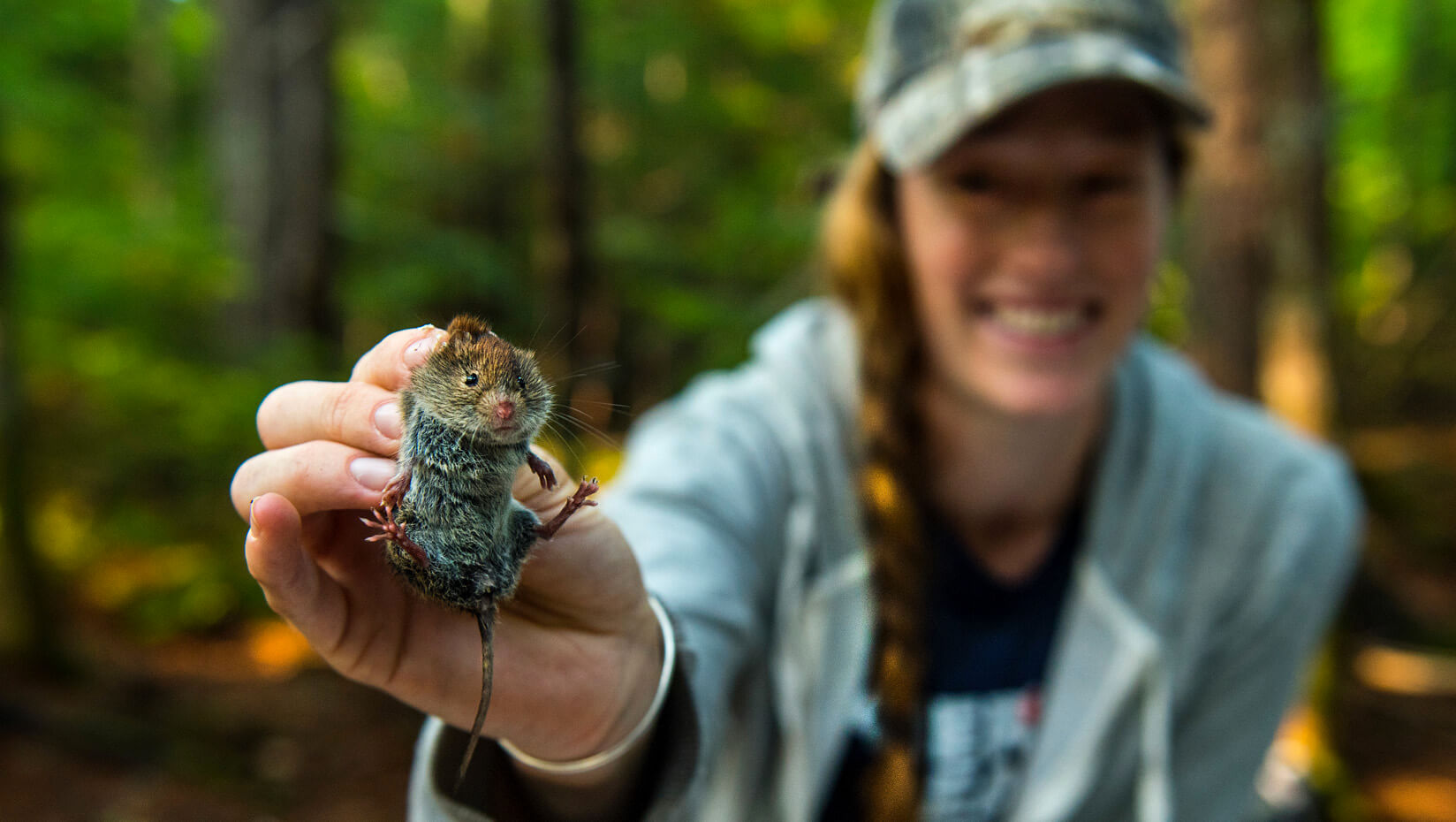
Mind over matter: Study looks at how personality of a mouse may affect the structure of a forest
Preserving a range of different personality types within small mammal populations is critical for maintaining the key ecosystem function of seed dispersal, according to University of Maine researchers.
Understanding how variation among individual seed-dispersing animals and whether land-use change interferes with the process is the focus of a recent study led by Allison Brehm, a Ph.D. student in wildlife ecology, and Alessio Mortelliti, an assistant professor of wildlife habitat ecology.
The study shows for the first time how a small mammal’s personality is fundamental to the plant communities within its territory, according to Mortelliti.
“Our findings are very exciting as we show that the boldness, timidness or anxiety of a mouse or a vole affects the way they interact with a seed and this, in turn, will affect the chances of the seed surviving,” Mortelliti says. “Essentially our study demonstrates that the mind of a mouse could potentially affect the whole structure of a forest.”
Small mammals exist to disperse seeds, according to Mortelliti.
“That’s their job in the ecosystem,” he says. “The whole life of a plant is about trying to use the service of rodents as much as possible.”
What an animal decides to do when it encounters a seed links back to personality, according to Mortelliti.
Personality, Brehm says, refers to individual-level differences in behavior that are consistent over time.
“In the same way that we, as humans, have personalities, so do animals such as mice and voles,” Brehm says.
Through a large-scale field experiment conducted on mice, voles and shrews in forests manipulated with three different silvicultural treatments, the team found an individual’s personality affects its choice of seeds, as well as how far and where they store them.
The team used three standardized tests and behavioral tracking software to measure personality in 648 free-ranging individuals from three species.
Traits measured included anxiety, which was determined by time spent grooming; docility, based on their response to being handled; and timidness/boldness, observed by how long they spent exploring versus staying put.
In a seed predation experiment, the team then observed interactions with seeds and assessed whether personality traits influenced decisions including seed selection, or seed mass preference; the distance a seed is moved; cache site, such as whether a seed is stored next to a fallen log, the base of a tree or under leaf litter; and the probability of consuming a seed.
The researchers also assessed personality types present in the three different forest treatments to determine whether human-made habitat changes shift the distribution of personality traits and influence seed dispersal.
The study found that personality traits in scatter-hoarding small mammals influence critical stages of seed dispersal since certain personality types are more likely to select larger seeds, cache them in optimal germination sites or disperse them farther away from the tree they originated from.
The distance of seed dispersal was affected by anxiety in mice and boldness in voles. Bold voles tended to disperse seeds farther than more timid ones. The probability of consuming a seed was influenced by activity levels in mice with more active mice tending to consume the seeds, thus killing a potential plant. The docility of a vole affected the caching site, with more docile voles storing seeds in locations that are optimal for germination such as close to a fallen log.
The researchers also found that habitat modifications change the distribution of personalities within a population by increasing the amount of bold, active and anxious individuals. This shift may affect the survival and dispersal of seeds, which could lead to cascading effects on ecosystems by modifying the structure and composition of forests.
This study indicates a need to promote the diversity of behaviors within populations as a target for the conservation of ecosystems, according to the researchers.
“The diversity of personalities in a population is critical to maintain the functioning of ecosystems, and we need to promote this diversity and better understand how to maintain it,” Brehm says.
“Land-use change and the ecological consequences of personality in small mammals” was published in the journal Ecology Letters. Other co-authors include George Maynard, who recently earned a Ph.D. in Wildlife Ecology from UMaine; and Joseph Zydlewski, an assistant unit leader with the Maine Cooperative Fish and Wildlife Research Unit.
Funding for the research came from the United States Department of Agriculture’s National Institute of Food and Agriculture McIntire-Stennis projects through the Maine Agricultural and Forest Experiment Station and the American Society of Mammalogists. Additional support came from the Penobscot Experimental Forest research funds.
A UMaine Today article on related research is online.
Contact: Elyse Catalina, 207.581.3747, elyse.catalina@maine.edu
